When to Fertilize Apple Trees? What You Need To Know!
-
Pete Ortiz
- Last updated:
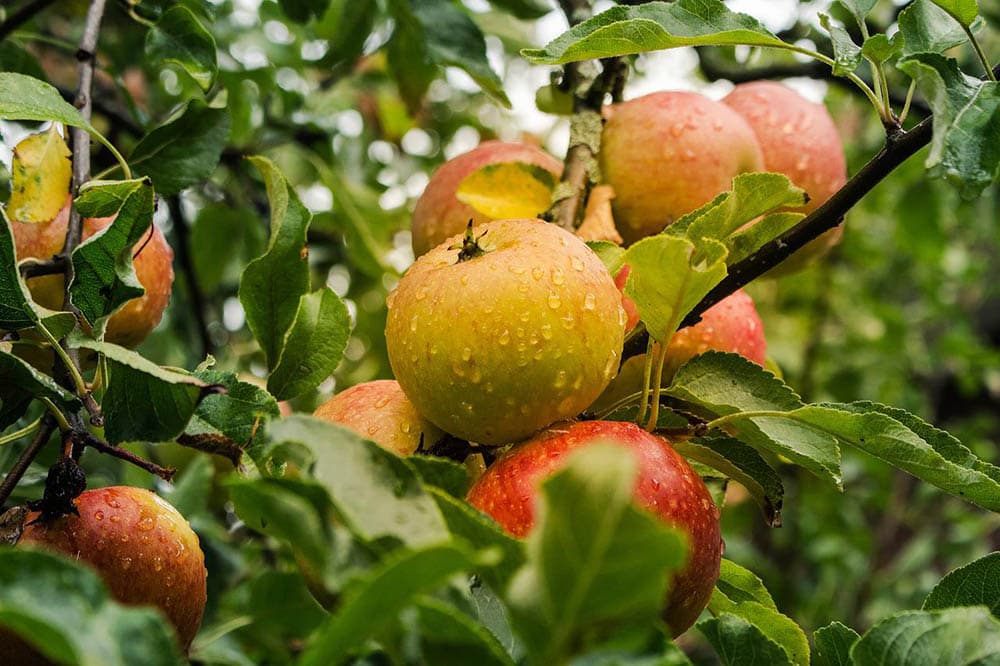
Every gardener needs a handy reference guide to get them started. That’s where we come in. Apple trees are a crucial part of any garden, but many gardeners don’t know how to care for them properly.
Apple trees produce fruit over a long period. So, it’s crucial to keep track of their care year-round. One way you can take care of your apple trees is by fertilizing them. Unfortunately, not every gardener knows when to fertilize apple trees. Some think regular maintenance is enough, but that isn’t true. You must know the best time to fertilize them if you want healthy apples.
That’s why we created this helpful guide for you. Here, we’ll tell you when to fertilize apple trees and how much to feed them. So, let’s get started!
When Do You Fertilize Your Apple Trees?
It’s not always easy to determine when to fertilize apple trees. Apple trees need regular fertilizing, but the best time varies with the tree.
Usually, they are fertilized in early spring before they’ve bloomed and set fruit. Apples are heavy feeders. So, give them a good boost of nutrients before they begin producing fruit.
Before fertilizing, it’s crucial to carry out a soil test to determine the nutrients your soil lacks. With this, you’ll know what ratio to apply your fertilizer. You will need to fertilize your apple trees three times during the growing season in most regions as seen in this table:
| Season | Apple Tree Stage | Application Stage | Region |
| Early Spring (Mid-April) | Before blossoming | First Application | Temperate and other regions |
| Late May | 1 month after blossoming | Second fertilizer application | All regions |
| End of June | 1 month after the second application | Third and last fertilizer application | All regions |
Why Should You Fertilize Your Apple Trees?
Apple trees need nutrients from the soil to grow well. When you add fertilizer, you will be adding these nutrients back into the soil. If you don’t add enough nutrients to your apple trees, they may have nutrient deficiency. So, they’ll not be productive the way they should, and you will see poor growth or poor fruit production.
Apple trees need macronutrients such as nitrogen, phosphorus, and potassium. If you want to harvest high-quality apples, apply the best fertilizer depending on the condition of your soil.
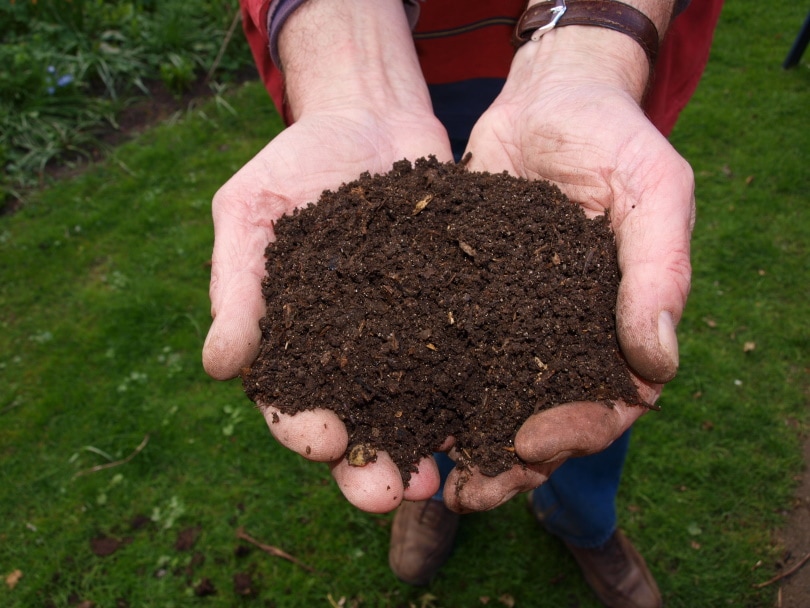
Fertilizer Application Methods
Fertilizer Spikes
Fertilizer spikes are the easiest way to apply fertilizer to your apple trees. They are made from plastic. You can put them in the soil around the tree base. They come in different sizes at any home improvement store or garden center.
Place a spike in each various sections of your apple tree’s root zone. Continue adding fertilizer spikes around the entire tree. They should be about 6 inches apart from one another.
Liquid Fertilizer
This is a mixture of nutrients (usually nitrogen and phosphorus). Nitrogen helps the plant grow faster and taller. On the other hand, phosphorus helps the plant develop more leaves and fruit.
Apply liquid fertilizers directly to the foliage or soil using a sprayer or handheld bottle.
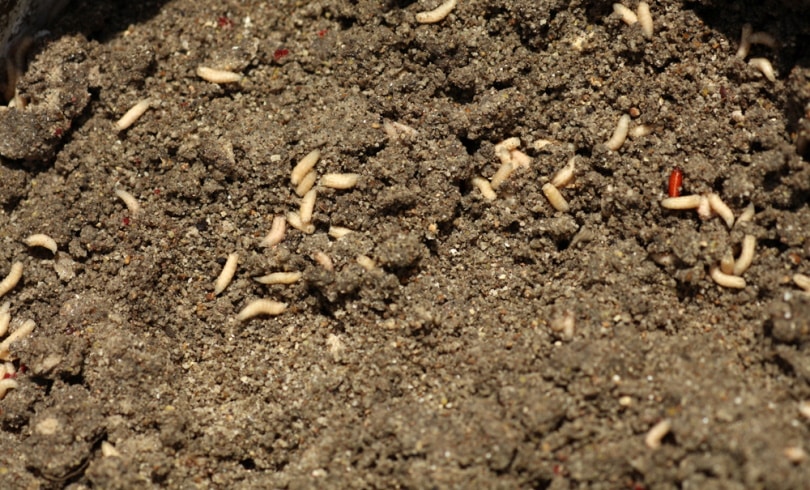
Dry Fertilizer
Dry fertilizer is the best option for apple trees. It’s easy to apply and has no burning effect on the leaves. Apply dry fertilizer in the fall or spring and around the time of planting.
Dry fertilizer comes in different forms such as pellets, granules, and powder. These are all different and offer several benefits to the soil.
Macronutrients Apple Trees Need
Apple trees are easy to care for. They need little water, fertilizer, and pruning. The fertilizer you apply should have the below nutrients:
Nitrogen (NK)
Apple trees need nitrogen for good health. Nitrogen is an essential element for the production of chlorophyll. Chlorophyll is the plant’s green pigment that converts sunlight and carbon dioxide into sugar. It allows plants to absorb water and use it as nourishment. So, nitrogen boosts vegetative growth (branches and leaves).
Phosphorous (P)
Phosphorus helps plants form strong roots and stems and improves the quality of the fruit.
Apple trees need a balanced supply of phosphorus to grow healthy and strong and produce buds that will turn into fruit. If your apple tree lacks phosphorus, you may notice that it produces fewer flowers or no flowers at all.
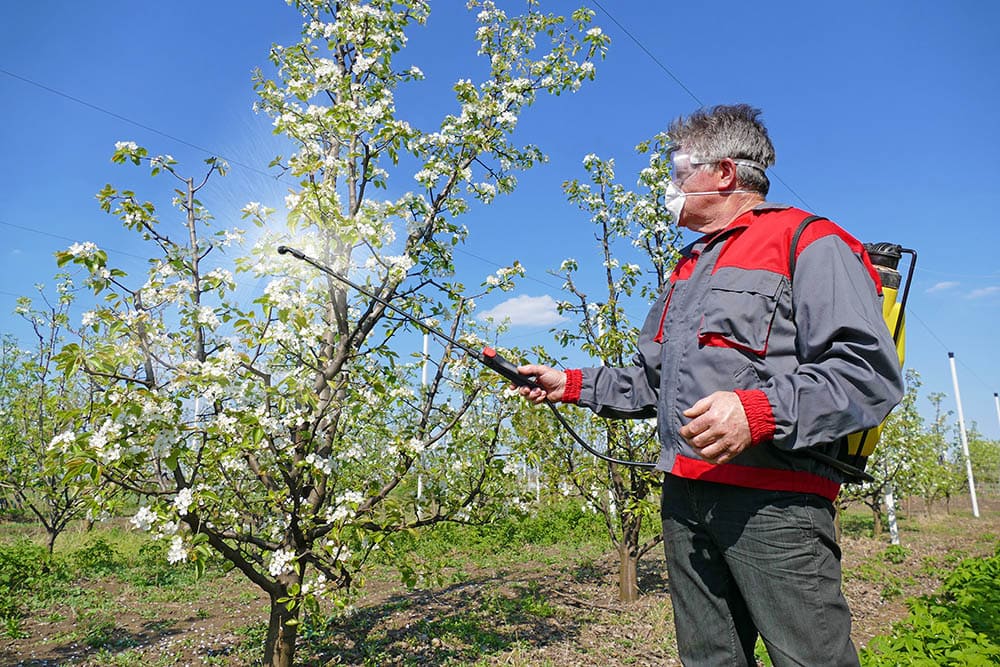
Potassium (K)
Potassium plays a crucial role in the growth of the apple tree, photosynthesis, and resisting diseases.
These are the primary macronutrients your apple tree needs. That’s why you see the initials “NPK” on fertilizers. NPK is Nitrogen (N), Phosphorous (P), and Potassium (K). Macronutrients are needed in large quantities.
Besides macronutrients, your apple trees need calcium, manganese, magnesium, zinc, and boron in small quantities. These micronutrients are crucial when the apple trees are developing buds and flowering.
Point to Note
- Apple trees don’t need much fertilizer if you plant them on fertile soil.
- Don’t over-fertilize your apple trees with nitrogen-rich fertilizers. Doing so will stop the trees from developing fruits. Instead, they’ll only grow the branches and leaves. Too much nitrogen can also make the trees prone to fire blight.
Organic Fertilizers to Use on Apple Trees
Besides inorganic fertilizers, organic fertilizers are also ideal for your apple trees. Here are several organic fertilizers you can apply to your apple trees:
Fish Fertilizer
Fish fertilizer is made from fish waste including bones and scales. Usually, fish are fed using pellets, which help break down the bones and other biological materials in the fish waste. The resulting material is dried and turned into a granular form you can use as a fertilizer. Fish fertilizer contains all the nutrients your apple tree needs, making it an excellent choice for growing apples.
Fish fertilizer has a rating of 9-3-0. It has 9% nitrogen, 3% phosphorous, and no potassium. It’s helpful for young apple trees that are growing slowly early in the season. But, due to its high magnesium content, it can cause problems when growing apples on sandy soil.
Alfalfa Meal
Alfalfa meal is an excellent organic fertilizer to fertilize your apple trees. It comes in powder form, and it’s easy to use. You can add this organic fertilizer directly to the soil or mix it with water and then apply it to the soil.
The best thing about using this organic fertilizer is that it doesn’t have any side effects on your apple trees. Alfalfa meal releases nitrogen into the soil quickly. It has a rating of 2-1-2 (2% nitrogen, 1% phosphorous, and 2% potassium).
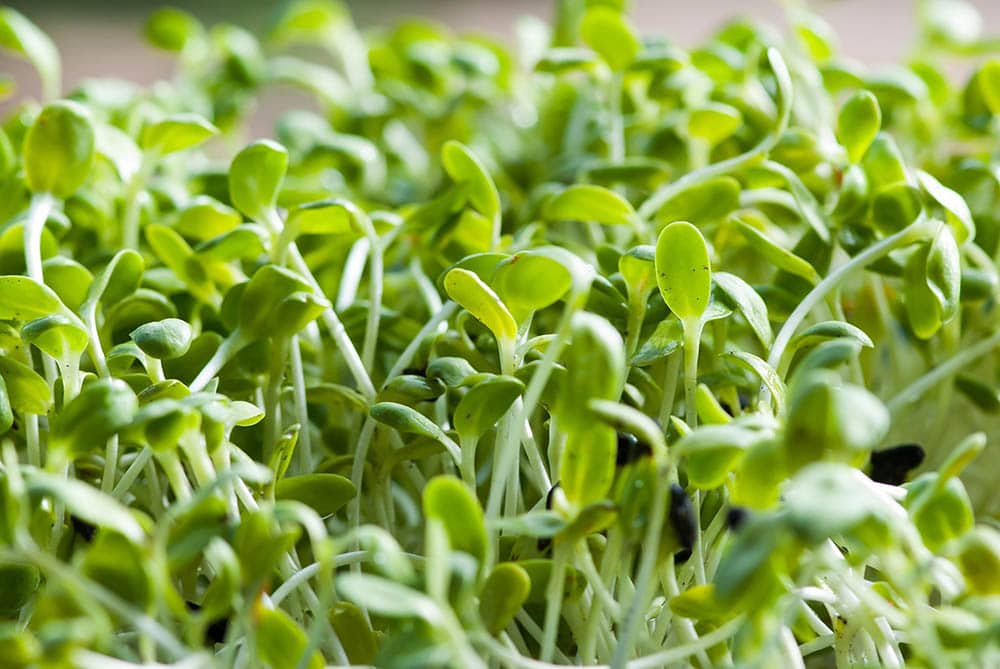
Blood Meal
Blood Meal is a natural fertilizer. It has been used by farmers for centuries. It’s a product of animal blood. You can use it the same way as other organic fertilizers, but it’s more concentrated than other organic fertilizers. Blood meal also contains nitrogen, essential for apple trees.
Blood meal has a rating of 12-0-0. It is also high in minerals that help with plant growth. These minerals include calcium and magnesium. They will help your apple trees grow strong and healthy while they get established in their new home!
Benefits of Using Organic Fertilizers
- Minimizes soil compaction
- Increases the availability of nutrients
- Mitigates the flow of pesticides
Conclusion
Apple trees need several different elements to grow and thrive. Most gardeners disregard the importance of fertilization and end up with unhealthy trees. They may also use synthetic or overpriced products.
Fertilize your apple trees at the right time and with a suitable fertilizer. By doing this, you’re giving them the essential nutrients they need to be productive. You’re also helping them to grow healthier, more robust fruits.
We have discussed the best time to plant your tree for optimal growth in this guide. Stick to the schedule and you will be on your way to receiving a bumper harvest.
Featured Image Credit: Lichtsammler, Pixabay
Contents


